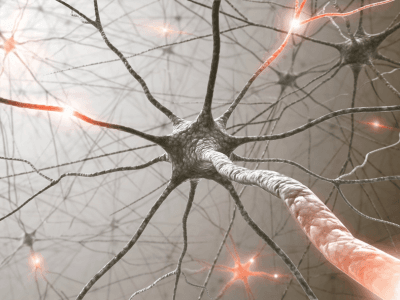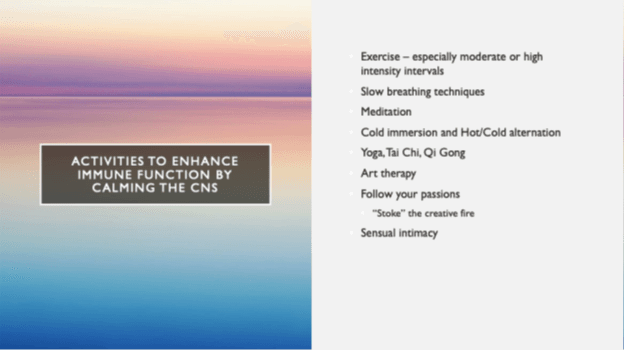Dr. Jason Miller Blog
The Role of Stress in Cancer: More Than Meets the Eye
ggg

After working in the field of collaborative cancer care for over 20 years, I’ve accumulated a wealth of knowledge about cancer's multifaceted nature. My journey has involved extensive research, immersion in molecular biology, and countless hours spent understanding the physiological factors and disrupted biochemical pathways that contribute to the development of cancer. Along the way, I have come to recognize an unsettling yet crucial truth: stress, particularly emotional stress, plays a pivotal role in the genesis and progression of cancer and many chronic diseases. Several studies done with animals have revealed how chronic stress makes the subjects less able to effectively adapt to toxins in their environment, leading to increased morbidity and mortality.
Understanding the Primary Disruptors
In my experience, three significant disruptors have emerged as primary contributors to cancer and chronic disease:
- Environmental Toxins: These include pollutants and chemicals that can interfere with cellular function.
- Chronic Infections: Persistent infections can lead to long-term inflammation and immune system dysfunction. There are also strong correlations made between particular microbial pathogens and the development of specific cancers.
- Nutrient Deficiencies: Lack of essential nutrients can weaken the body's defenses against disease.

Each disruptor can independently create biological vulnerability. When combined, their detrimental effects are amplified, making the body more susceptible to disease. Fortunately, our bodies have an inherent adaptive capacity that allows us to cope with these challenges, but when we are under the influence of chronic stress, our adaptive capacity is diminished.
Key Effects of Chronic Stress:1,2
- Inhibition of Immune Function: Chronic stress can lead to a weakened immune response, reducing the body's ability to identify and destroy cancer cells.
- Hyperinflammatory States: This can lead to a host of physiological disruptions, including autoimmune conditions, and can promote cancer development and progression.
- Dysregulation of Metabolic Processes: Stress can affect glucose and insulin regulation, disrupt hormone metabolism, increase oxidative stress, and promote hypercoagulation, all of which can promote cancer growth.
The Beta-Adrenergic System (BAR) and Cancer
Recent studies have shown that the beta-adrenergic receptor (BAR) system, closely linked to the stress response, is involved in cancer growth. This system influences angiogenesis (formation of new blood vessels) and tumor invasion, demonstrating just how intertwined stress and cancer can be.
Fascinating new research into the molecular biology of cancer has unveiled the fact that cancers favor sympathetic nerve fibers in their tumor microenvironmental make-up. Sympathetic fibers surround or even enter the tumor parenchyma in association with blood vessels and provide neoplasm cells with higher neurotransmitter concentrations than those achieved in the bloodstream. What this boils down to is that cancers can literally feed off of the increased levels of sympathetic neurotransmitters released into the bloodstream under the influence of chronic stress.3

The Neuroendocrine Immune Axis
The connection between the immune and neuroendocrine systems, known as the "neuroendocrine immune axis," is significant. When stress disrupts neuroendocrine function, it can lead to immune system dysregulation, reducing the body's capacity to fight cancer effectively. Recent research has revealed that cancer patients have increased levels of stress hormones.4-6
Research has also indicated that a group of medications called non-selective beta-blockers, like propranolol, can inhibit cancer cell viability and improve survival rates in various cancer types.7-9
This evidence lends support to the use of specific phytochemicals and lifestyle therapies to calm the central nervous system - thereby enhancing immune system function, inflammatory cell signaling, and the activation of cancer-fighting immune cells.
The Vagus Nerve
The parasympathetic system, and primarily the vagus nerve, informs the brain about multiple signals and returns the body to homeostasis. The vagus nerve activates the parasympathetic nervous system, and it is particularly influential within the parasympathetic nervous system as it carries 75% of all parasympathetic fibers. This is often referred to as the “rest and digest” system. Interestingly, recent studies have shown that vagal nerve activity independently predicts prognosis in cancer. When vagal nerve activity is high, cancer stage no longer predicts tumor burden.10
The interaction between the vagus and sympathetic systems, classically characterized as opposite and reciprocal, can also be both synchronous and synergistic. The vagus and sympathetic inputs to the heart should no longer be seen as polar antagonists, but more like yin and yang elements: different but often complementary.11

Heart Rate Variability (HRV): A Key Indicator
Healthy biological systems exhibit complex patterns of variability. Heart Rate Variability (HRV) is another important aspect to consider. Unlike heart rate—which measures the number of beats per minute—HRV assesses the variation in time between heartbeats, reflecting the body’s adaptability to stress. A healthy heart is not a metronome. "An optimal level of HRV within an organism reflects healthy function and an inherent self-regulatory capacity, adaptability, and resilience." Studies show that high HRV correlates with better cancer prognoses, indicating a resilient autonomic nervous system.12
Newly developed software can measure imperceptible time differences between normal beats. Welltory is a well-known app that can be a useful tool for monitoring HRV.
Strategies to Enhance HRV:
- Mindfulness and Meditation: Practicing mindfulness can improve HRV and reduce stress.
- Regular Exercise: Physical activity promotes heart health and can enhance HRV.
- Balanced Nutrition: A nutrient-rich diet supports overall health and aids in stress management.
The Role of Adaptogens in Combatting Stress
Adaptogens are natural compounds that help the body adapt to stress and maintain balance. These herbs have been shown to boost immunity, improve mental focus, and enhance resilience.

Some key adaptogens include:
- Ashwagandha: Known for its ability to reduce stress and anxiety.
- Rhodiola: Helps enhance physical and mental performance under stress.
- Holy Basil: Supports overall well-being and helps combat stress.
Incorporating adaptogens into your daily routine can be a powerful strategy for managing stress and bolstering your immune system. This is why the application of adaptogens is a fundamental part of my strategy for improving the quality and quantity of life in the people I work with.
Conclusion
Beyond understanding the complex biology of cancer—its genetic mutations and the pathways it hijacks—effectively addressing cancer also requires recognizing the profound impact of chronic stress and the essential role of maintaining a calm, balanced nervous system. In my work with cancer patients today, targeting the stress response has become a central theme. I will continue to deepen my understanding of its complex role in human physiology while developing more effective therapeutic strategies to address this often-overlooked aspect of disease.

References
- Weber D, Wheat JM, Curri GM. Inflammation and cancer: tumor initiation, progression and metastasis, and Chinese botanical medicines. Zhong Xi Yi Jie He Xue Bao. 2010 Nov;8(11):1006-13. doi: 10.3736/jcim20101101. PMID: 21078262.
- J Gerontol A: Biol ScMed Sci 2001;56:M477–82, Prog Neuroendocrine Immunol 1992;5:199–214, J Clin Oncol 2005;23:7105–13
- Cole S.W., Nagaraja A.S., Lutgendorf S.K., Green P.A., Sood A.K. Sympathetic nervous system regulation of the tumour microenvironment. Nat. Rev. Cancer. 2015;15:563–572. doi: 10.1038/nrc3978
- Journal of the National Cancer Institute 1998; 90(1):30–36
- Brain Behav. Immun. (2012), http://dx.doi.org/ 10.1016/j.bbi.2012.06.015,
- Nature Medicine 2006; 12(8):939–944. Oncol Res. 2010;19(1):45-54.
- Mayo Clinic Proceeding November 2013 Vol. 88 # 11; Mayo Clin Proc. 2013;88(11):1196-1203;
- Breast Cancer Research and Treatment, August 2013, Volume 140, Issue 3, pp 567-575
- Baek MH, Kim DY, Kim SO, Kim YJ, Park YH. Impact of beta blockers on survival outcomes in ovarian cancer: a nationwide population-based cohort study. J Gynecol Oncol. 2018 Nov;29(6):e82. doi: 10.3802/jgo.2018.29.e82. PMID: 30207092; PMCID: PMC6189440.
- Gidron Y, De Couck M, De Greve J. If you have an active vagus nerve, cancer stage may no longer be important, J Biol Regul Homeost Agents. 2014 Apr-Jun;28(2):195-201.
- Integrative Cancer Therapies 2016, Vol. 15(1) 113– 123 DOI: 10.1177/1534735415617282 ict.sagepub.com
- Shaffer F, Ginsberg JP. An Overview of Heart Rate Variability Metrics and Norms. Front Public Health. 2017 Sep 28;5:258. doi: 10.3389/fpubh.2017.00258. PMID: 29034226; PMCID: PMC5624990.
Join the Mederi Center community by signing up for our email list. We send several emails a month with product promotions for patients, practical tips for healthy living, blogs written by our Care Team, information about events, and other news. You can unsubscribe at any time.

Meet Dr. Jason Miller
Jason Miller, DACM, LAc, is a doctor of acupuncture and Chinese medicine with nearly two decades of experience helping people navigate cancer, chronic illness, and complex health challenges. He blends the wisdom of traditional Chinese medicine with modern biomedical therapies, creating integrative treatment plans that are both personalized and collaborative. Dr. Miller’s areas of expertise include cancer care, autoimmune disease, diabetes, environmental toxicity, neurocognitive decline, and chronic fatigue. In addition to his clinical work, he serves as Head of Faculty and Content Development for the Mederi Academy and as a medical educator for Natura Health Products. Passionate about whole-person healing, Dr. Miller incorporates bodywork and acupuncture alongside botanical and nutritional medicine to help patients restore balance, resilience, and vitality. Learn more about Dr. Miller here.
Interested in becoming a patient? If you’d like to work with Dr. Miller, please fill out the form on our Become a Patient page or call 541-488-3133 to make an appointment.


